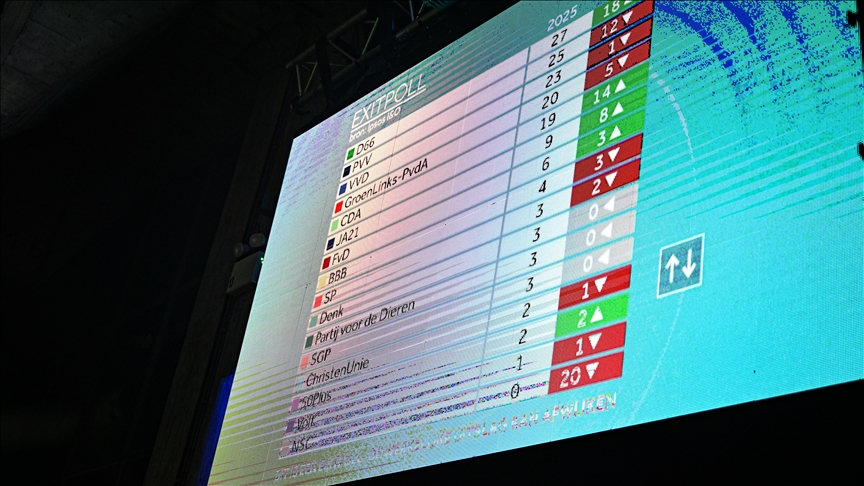Dutch snap election: Far-right loses ground as Netherlands braces for lengthy coalition talks after hung vote
Expert warns formation of new government could take months or even a year amid fragmented political landscape
 Photo by Mouneb Taim
Photo by Mouneb Taim
THE HAGUE/ISTANBUL
The Netherlands is bracing for protracted coalition talks after far-right leader Geert Wilders’ Party for Freedom (PVV) suffered significant losses in Wednesday’s snap general election, leaving no party with a parliamentary majority.
Preliminary results showed the centrist Democrats 66 (D66) and the far-right PVV running neck and neck, each securing 16.7% of the vote and 26 seats in the 150-member parliament.
D66 emerged as the election’s biggest surprise, gaining more than 10% compared to the previous vote two years ago, while Wilders’ anti-Islam PVV saw its support drop by around 7%.
The liberal People's Party for Freedom and Democracy (VVD), led by Dilan Yesilgoz, which entered the election as the senior partner of the minority government, lost more than 1% to finish third with 14.1%. The center-left Green Left–Labour Party (GL-PvdA) alliance dropped 3.2% to 12.5%, taking fourth place.
The Christian Democratic Appeal (CDA), often mentioned as a possible coalition partner, achieved another surprise by increasing its vote share by 8.4% to 11.7% and finishing fifth.
According to preliminary results, the right-wing JA21 party received 5.9%, the far-right Forum for Democracy (FvD) 4.5%, the pro-farming BoerBurgerBeweging (BBB) party 2.6%, and DENK, whose members are mostly of Turkish and Muslim origin, maintained its vote share of 2.4%, retaining its three parliamentary seats.
- Long coalition process expected
Historian and international politics expert Hidde Bouwmeester told Anadolu that the formation of a new government may take months or even up to a year.
“What I see is that a lot of the far right, from Geert Wilders to BVV, are strategically going to the center-right of the VVD, the conservative liberals on the center-right, and that surprises us that even the progressive center of D66 is about to win and lead the coalition if it's about to be from the center or the center-right,” he said.
- 2 coalition scenarios
Bouwmeester said two possible coalition options stand out. In the first, left-wing parties could be included in the coalition, “but there's also an option that not the left is going to be in a coalition, but it's more a split from a far right or a far-right party who are now more as an option for center-right voters,” he said.
He said the first scenario would involve a centrist coalition of D66, VVD, GL-PvdA, and CDA, but noted that the biggest obstacle to this option is VVD’s refusal to form a coalition with GL-PvdA.
The second scenario, he said, would be a center-right coalition of D66, VVD, CDA, and JA21.
However, Bouwmeester noted that D66’s biggest challenge in this option would be the need to form a coalition with the conservative JA21 despite having pledged during the campaign to exclude the far right.
He said such a coalition could disappoint D66's voter base and pose a significant risk to the party, as well as undermine the unifying message that helped D66 increase its vote share.
Bouwmeester said he does not expect Wilders' PVV to participate in the government in either scenario.
In the first scenario, it is possible for one of the major parties, VVD, to be excluded, making the cost of this option unclear. In the second scenario, GL-PvdA is not included, and D66’s inclusion of the far-right JA21 in the coalition would bring numerous disagreements, he noted.
D66 leader Rob Jetten had stated during the campaign that he wanted a coalition government excluding the far right and including center-right and left-wing parties and opposed the government’s unconditional support for Israel.
- Timmermans resigns after loss
Frans Timmermans, leader of the GL-PvdA alliance, which lost votes in the election, announced his resignation.
"We didn't succeed—I didn't succeed—in convincing enough people to vote for us. I take full responsibility for that. That's why I want to hand over the reins to the next generation," he said.
- 4-party coalition required
According to the election results, at least a four-party coalition is required to reach a parliamentary majority. Political observers note that coalitions involving center-right or centrist parties are the most likely, but the government formation process is expected to be difficult, and a return to the polls cannot be ruled out.
After the previous general election held on Nov. 22, 2023, a far-right–center-right coalition government led by Wilders—which he had called the only option from the start—collapsed in June 2024 when his party withdrew from the coalition, prompting the snap election.
Anadolu Agency website contains only a portion of the news stories offered to subscribers in the AA News Broadcasting System (HAS), and in summarized form. Please contact us for subscription options.

